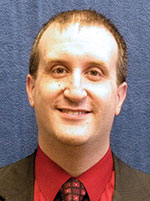Worship and Evangelization Outreach / Andrew Motyka
Sacraments remind us that Christ is the High Priest
 In August, a priest in the Archdiocese of Detroit discovered that his baptism, which he received 30 years ago, was invalid. This story made waves all around the Catholic world, and it was accompanied by an affirmation from the Vatican that the formula, “We baptize you in the name of the Father, and of the Son, and of the Holy Spirit”—rather than “I baptize you”—is considered invalid form for the sacrament of baptism. While this seems like a minor issue, it is relevant to the administration of all sacraments. The words we use matter.
In August, a priest in the Archdiocese of Detroit discovered that his baptism, which he received 30 years ago, was invalid. This story made waves all around the Catholic world, and it was accompanied by an affirmation from the Vatican that the formula, “We baptize you in the name of the Father, and of the Son, and of the Holy Spirit”—rather than “I baptize you”—is considered invalid form for the sacrament of baptism. While this seems like a minor issue, it is relevant to the administration of all sacraments. The words we use matter.
Sacramental form is the term we use to describe the words and gestures involved in celebrating a sacrament. All of the words and actions are important, as they are given to us by the Church, the supreme legislator of the sacraments.
Though the intent of the minister celebrating the sacraments plays a role, some of the words and actions are more important than others. If certain words or actions are changed, the sacrament might even be invalid (meaning the action was not sacramental). In addition to sacramental form, a sacrament also needs the proper matter: the physical part of the sacrament, such as the bread and wine for Eucharist, or water for baptism. A sacrament must also be celebrated by a proper minister. Usually this is a priest or bishop, occasionally a deacon, and sometimes a lay person (for example, the sacrament of matrimony).
It is important to note, however, that the source of all the sacraments is Jesus Christ, who is the head of the Church and the high priest. The Church uses the term in persona Christi Capitis (in the person of Christ the Head [of the Church]) to describe Christ’s action through sacramental ministers.
As St. Thomas Aquinas says, “Christ is the source of all priesthood: the priest of the old law was a figure of Christ, and the priest of the new law acts in the person of Christ” (Catechism of the Catholic Church, #1548). In other words, it is Christ himself who celebrates the sacraments.
This is best understood at Mass: when the priest says “This is my body …,” it is Jesus himself who says that. It is by Christ’s action that all sacraments are brought about. This is not limited to the celebration of the Eucharist.
Every sacramental act is celebrated by Christ. When a priest, bishop, deacon or (in an emergency) layperson baptizes a person, it is Jesus who baptizes. This is why it is not proper to say “We baptize you,” since it is not a communal act, but “I baptize you,” because it is an act of Christ the high priest. Likewise, when a priest says, “I absolve you from your sins …” in the sacrament of reconciliation, it is Christ himself who absolves you.
The words and actions of our sacraments are important because they reflect the reality of our faith. It may seem pedantic to focus on such little changes, but they can make a big difference in the reality of our celebrations. What we do is real, and the words we use can shape our faith, so intentionality about our word choice is critical when celebrating the sacraments.
(Andrew Motyka works in the Office of Worship as the director of Archdiocesan and Cathedral Liturgical Music for the Archdiocese of Indianapolis. He can be reached at amotyka@archindy.org.) †
 In August, a priest in the Archdiocese of Detroit discovered that his baptism, which he received 30 years ago, was invalid. This story made waves all around the Catholic world, and it was accompanied by an affirmation from the Vatican that the formula, “We baptize you in the name of the Father, and of the Son, and of the Holy Spirit”—rather than “I baptize you”—is considered invalid form for the sacrament of baptism. While this seems like a minor issue, it is relevant to the administration of all sacraments. The words we use matter.
In August, a priest in the Archdiocese of Detroit discovered that his baptism, which he received 30 years ago, was invalid. This story made waves all around the Catholic world, and it was accompanied by an affirmation from the Vatican that the formula, “We baptize you in the name of the Father, and of the Son, and of the Holy Spirit”—rather than “I baptize you”—is considered invalid form for the sacrament of baptism. While this seems like a minor issue, it is relevant to the administration of all sacraments. The words we use matter.